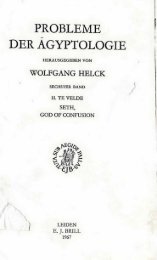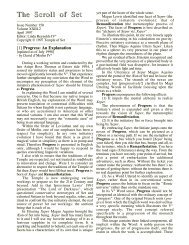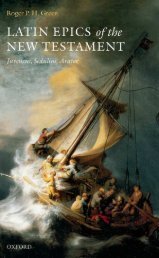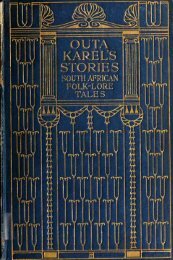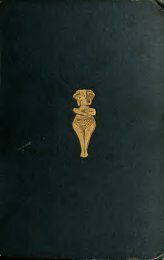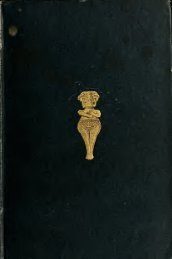- Page 5 and 6:
ARYAN MYTHOLOGY. VOL. II.
- Page 7:
THE MYTHOLOGY OF THE ARYAN NATIONS.
- Page 10 and 11:
VI CONTENTS OF Section X,—HELLENI
- Page 12 and 13:
Vlll Krishna and Kudra Vishnu and K
- Page 14 and 15:
Prometheus and Pandora Prometheus a
- Page 16 and 17:
XI Phrixos and Helle Athamas and In
- Page 18 and 19:
XIV The Story of Sarama and Helen I
- Page 21 and 22:
THE MYTHOLOGY OF THE AEYAN NATIONS
- Page 23 and 24:
THE CHARITES OR GRACES. '} Charites
- Page 25 and 26:
APHRODITE AND AINEIAS. walls of Ili
- Page 27 and 28:
ADONIS. i CHAP, like that of Meleag
- Page 29 and 30:
VENUS. 9 the story of Anchises was
- Page 31 and 32:
HERE AND ZEUS. 11 and Echidna, and
- Page 33 and 34:
IDEA OF NECESSITY. 13 thus she has
- Page 35 and 36:
THE FATAL SISTERS. 15 to the fearfu
- Page 37 and 38:
THE FATES. 17 of the moralist or th
- Page 39 and 40:
YGGDRASIL AND IRMINSUL. 19 who leav
- Page 41 and 42:
THE WANDERINGS OF LET6. 21 Nor can
- Page 43 and 44:
DELOS AND OKTYGIA. 28 bright land (
- Page 45 and 46:
THE FISH SUN. 25 to Telphoussa, to
- Page 47 and 48:
SISYPHOS AND IXION. 27 inherent att
- Page 49 and 50:
DAPHNE AND BOLINA. 29 she prays tha
- Page 51 and 52:
ENDYMION AND TITHONOS. 31 sleep, is
- Page 53 and 54:
THE HEALERS. 66 very name denotes t
- Page 55 and 56:
ASKLEPIOS. 85 Cyrus and Komulus. Wh
- Page 57 and 58:
THE WISDOM OF ATLAS. 37 to the dail
- Page 59 and 60:
HYPERION. o9 other than the house o
- Page 61 and 62:
ALKESTIS. in isolated patches on th
- Page 63 and 64:
THE BIRTH OF HERAKLES. 43 long as w
- Page 65 and 66:
THE TOILS OF HERAKLES. 45 which Are
- Page 67 and 68:
HERAKLES AND LAOMEDON. 47 who makes
- Page 69 and 70:
THE MARATHONIAN AND CRETAN BULLS. 4
- Page 71 and 72:
ARfiS AND XYKNOSi 51 mond of Toulou
- Page 73 and 74:
HERAKLES THE BONDMAN 53 Iphitos as
- Page 75 and 76:
HEEAKLES AND BELLER0PH6N. 55 and ra
- Page 77 and 78:
THE BANISHMENT OF THE HERAKLEIDS. 5
- Page 79 and 80:
DANAE AND DIKTYS. wrath decrees tha
- Page 81 and 82:
DANAE AND AITHRA. 61 games which Te
- Page 83 and 84:
SINIS, THE PINE-BENDER. 63 travelle
- Page 85 and 86:
THE TRIBUTE CHILDREN. 65 and thus t
- Page 87 and 88:
THE CHILDREN OF THESEUS AND HERAKLE
- Page 89 and 90:
LAIOS AND ASTYAGES. b { J who stand
- Page 91 and 92:
THE RIDDLE OF THE SPHINX. in all mo
- Page 93 and 94:
; THE DEATH OF OIDIPOUS. 73 In this
- Page 95 and 96:
TELEPHOS AND PARIS. 75 enemy Idas.
- Page 97 and 98:
THE ACHAIAN AND TROJAN CHIEFS. 77 a
- Page 99 and 100:
THE JUDGMENT OF PARIS. 79 clone. Th
- Page 101 and 102:
IAMOS. 81 masters her love,. and sh
- Page 103 and 104:
KOMULUS AND CYRUS. 83 at his birth.
- Page 105 and 106:
THE CHILDREN OF TELEPHASSA. 85 The
- Page 107 and 108:
THE MINOTAUROS. C in the lists of A
- Page 109 and 110:
THE OLD AGE OF NESTOR. 89 For the Y
- Page 111 and 112:
MEMNON AND MIMIR. 91 wrought by the
- Page 113 and 114:
BALDUR AND HODR. 93 out with his to
- Page 115 and 116:
THE DYING YEAR. ' Close not thy lip
- Page 117 and 118:
THE LEGEND OF TELL. 97 Sarpedon sug
- Page 119 and 120:
WILLIAM OF CLOUDESLEE. 9 sion and m
- Page 121 and 122:
OTHER. VERSIONS OF THE MYTH OF TELL
- Page 123 and 124:
THE STRIDES OF VISHNU. 103 6 Thou,
- Page 125 and 126:
DWARF GODS. 105 Krishna, who, havin
- Page 127 and 128:
VISHNU AND KRISHNA. 107 the months
- Page 129 and 130:
THE VITAL POWERS OF NATURE. 109 sen
- Page 131 and 132:
POLYTHEISM AND MONOTHEISM. Ill Hera
- Page 133 and 134:
— THE QUICKENING SUN. 113 Judah a
- Page 135 and 136:
THE STAUEOS AXD THE RING. 115 which
- Page 137 and 138:
THE SERPENT AND THE CROSS. 117 geth
- Page 139 and 140:
THE SHIP OF ISIS. 119 shaped vessel
- Page 141 and 142:
CUPS AND MIRRORS. 121 inexhaustible
- Page 143 and 144:
THE SANGREAL. 123 and preserved the
- Page 145 and 146:
MYSTERIES. 125 an irresistible impu
- Page 147 and 148:
THE ELEUSIXIAN MYSTERIES. IZi It is
- Page 149 and 150:
THE BULL AND THE SEKPENT. 129 way t
- Page 151 and 152:
KRISHNA, RUDRA, AND VISHNU. 131 the
- Page 153 and 154:
THE BIRTH OF KRISHNA. 133 the more
- Page 155 and 156:
KRISHNA AND THE GOriAS. lo the king
- Page 157 and 158:
THE DEATH OF KRISHNA. 137 prisoners
- Page 159 and 160:
THE WANDERINGS OF 10. 139 the myths
- Page 161 and 162:
HEKATE AND PHOIBOS. 14 of the Chaly
- Page 163 and 164:
ARTEMIS. 143 either case the bright
- Page 165 and 166:
ARTEMIS AND IPHIGENEIA. 145 surate
- Page 167 and 168:
147 CHAPTER III. THE LOST TREASURE.
- Page 169 and 170:
RECURRING CYCLES. 149 features are
- Page 171 and 172:
OKPHEUS AND THE ARGONAUTAI. root),
- Page 173 and 174:
MEDEIA AND ABSYRTOS. incidents whic
- Page 175 and 176:
THE CHILDREN OF MEDEIA. 155 The rob
- Page 177 and 178:
HELENE DENDRITIS. 157 her brothers
- Page 179 and 180:
THE STORY OF CONALL GULBAN. But the
- Page 181 and 182:
MELEAGROS AND THE KOURETES. 161 her
- Page 183 and 184:
ACHILLEUS IN WOMAN'S GARB. 163 appe
- Page 185 and 186:
THE WRATH OF ACIIILLEUS. 16 son has
- Page 187 and 188:
PATROKLOS AND SARPEDON. longer perp
- Page 189 and 190:
THE ARMING OF ACHILLEUS. 10 he tell
- Page 191 and 192:
THE RETURN OF THE ACHAIANS. he disc
- Page 193 and 194:
PENELOPE. 17 and Sisyphos. The proc
- Page 195 and 196:
ODYSSEUS AND HIS COMRADES. 175 none
- Page 197 and 198:
THE BAG OF WINDS. 177 of the flock
- Page 199 and 200:
ODYSSEUS IN ITHAKA. 179 comrades wi
- Page 201 and 202:
HYLLOS AND EURYSTHEUS. 181 the west
- Page 203 and 204:
KARNOS AND CHRYSES. 10 the preparat
- Page 205 and 206:
AMPHIAEAOS AND ERIPHYLE. 185 with t
- Page 207 and 208:
THE DEATH OF AMPHIAKAOS. 1ST praise
- Page 209 and 210:
OKESTES AND PYLADES. IS precious ne
- Page 211 and 212:
THE PARENTAGE OF AGNI. 19; one is s
- Page 213 and 214:
KALI AND KARALI. 193 of hidden trea
- Page 215 and 216:
PHORONEUS AND NIOBE. 195 line, spea
- Page 217 and 218:
HESTIA AND PHOIBOS. 1\) Kronos and
- Page 219 and 220:
HEPHAISTOS AND LOKI. 199 lessness o
- Page 221 and 222:
201 Section IV.—PROMETHEUS. Anoth
- Page 223 and 224:
THE HESIODIC AGES. 203 are the men
- Page 225 and 226:
THE GIFT OF FIEE. 205 and thus brin
- Page 227 and 228:
THE TORTURING OF PROMETHEUS. 207 or
- Page 229 and 230:
THE MYTH OF PANDORA. 209 Hermes gav
- Page 231 and 232:
THE TWILIGHT OF THE GODS. 211 Zeus
- Page 233 and 234:
POLYPHEMOS. 213 or boat-shaped embl
- Page 235 and 236:
THE WARS OF THE TITANS. 215 wrought
- Page 237 and 238:
ROCK-SPLITTING PLANTS. 217 by iElia
- Page 239 and 240: THE LIGHTNING. it'—the wonderful
- Page 241 and 242: 221 CHAPTER V. THE WINDS. Section I
- Page 243 and 244: RUDRA. destroyer and reproducer, fo
- Page 245 and 246: THE CKADLE OF HERMES. 225 an old ma
- Page 247 and 248: THE COMPACT BETWEEN HERMES AXD FHOI
- Page 249 and 250: INFANCY OF THE GODS. 229 accommodat
- Page 251 and 252: HERMES AND SARAMEYA. 231 wliicli ma
- Page 253 and 254: TH E GOD OF THE MOVING AIR. 233 mus
- Page 255 and 256: THE PRYING HERMES. 235 know the sec
- Page 257 and 258: LATER ATTRIBUTES OF HERMES. 237 As
- Page 259 and 260: ORPHEUS AND EURYDIKfi. sometimes ga
- Page 261 and 262: THE HARP OP ORPHEUS. 241 Mr. Kelly,
- Page 263 and 264: THE PIPER OF BRANDEXBURG. 243 is a
- Page 265 and 266: THE HORN OF OBEROX. 245 In a less d
- Page 267 and 268: THE EASTERN AND WESTERN SIBYLS. sin
- Page 269 and 270: PAX AXD PITYS. 249 our eyes open al
- Page 271 and 272: PHILOMELA AXD PEOKXE. 251 legend th
- Page 273 and 274: THE MOLIOXES AND AKTORIDAI. 253 But
- Page 275 and 276: akes and adonis, 255 the god has la
- Page 277 and 278: THE NYMPHS. 257 Theogony lie is a s
- Page 279 and 280: THETIS. 259 among whom she dwells.
- Page 281 and 282: SKYLLA. 261 shoots out her hungry h
- Page 283 and 284: TOSEIDOX THE HORSE-TAMER. 26 1 and
- Page 285 and 286: MELIKERTES AND KADMOS. 26 than that
- Page 287 and 288: FOREIGN NAMES IN GREEK MYTHOLOGY. 2
- Page 289: DANAOS AND GELANOR. 2G9 adopted, we
- Page 293 and 294: INO AND NEPHELE. 273 essence of the
- Page 295 and 296: THE PHAIAKIAN LAND. 275 tale, how l
- Page 297 and 298: THE PHAIAKIAN FLEET. is not a city
- Page 299 and 300: THE KOURETES AND TELCIIINES. 279 da
- Page 301 and 302: 281 Section III.—THE NYMPHS AND S
- Page 303 and 304: SWAN-MAIDENS. fact, be nothing more
- Page 305 and 306: THE STORY OF GUZRA BAI. 285 version
- Page 307 and 308: THE GLOAMING. 287 visible in a weir
- Page 309 and 310: ATHENE CHALINITIS. 289 from the fou
- Page 311 and 312: THE DANCERS OF THE SKY. 291. 'with
- Page 313 and 314: 293 CHAPTER VIII. THE EARTH. Sectio
- Page 315 and 316: DIONYSOS THE WANDERER. the prominen
- Page 317 and 318: THE SEARCH FOE THE LOST MAIDEN. 297
- Page 319 and 320: THE MAIDEN AND THE MOTHER. 290 to t
- Page 321 and 322: THE witch's garden. 301 stow his da
- Page 323 and 324: THE WINTER PRISON. oUd bride of tli
- Page 325 and 326: EARTH, THE MOTHER. 305 who carries
- Page 327 and 328: DEMETER AND IASlON. 307 the origin
- Page 329 and 330: ERECHTHEUS AND KEKROPS. oU mother w
- Page 331 and 332: 311 Section IV.—THE PRIESTS OF TH
- Page 333 and 334: PHOIBOS AND THE TELCHINES. 313 With
- Page 335 and 336: 315 Section V.—THE PEOPLE OF THE
- Page 337 and 338: MIDAS AXD MARSYAS. 317 idea doubtle
- Page 339 and 340: 319 CHAPTER IX. THE UNDERWORLD. Sec
- Page 341 and 342:
THE RIVERS OF HADES. ?>21 geography
- Page 343 and 344:
TARTAIIOS common crowd in wickednes
- Page 345 and 346:
OUTLINES OF THE STORY OF HELEN. 325
- Page 347 and 348:
VRITRA AND ORTHROS. 327 reach the c
- Page 349 and 350:
THE ENEMIES OF INDRA. 329 the god o
- Page 351 and 352:
THE TROJAN PARIS. virtually transla
- Page 353 and 354:
PENELOPE AND THE SUITORS. 66 are se
- Page 355 and 356:
GERYONES AND KERBEROS. 335 and acco
- Page 357 and 358:
THE STOLEN CATTLE. 33 tliis insatia
- Page 359 and 360:
HERCULES AND HERCULUS. 339 the fath
- Page 361 and 362:
OECUS AND KAIKIAS. form Kakios, and
- Page 363 and 364:
CHIMAIRA. 34 Hipponoos is said to h
- Page 365 and 366:
VKITRA AND THE SPHINX. 34 Egyptian
- Page 367 and 368:
THE SNAKE OF WINTER. 347 But if the
- Page 369 and 370:
THE TRIBUTE CHILDREN OF ATHENS. 349
- Page 371 and 372:
MEDOUSA. 351 had once been beautifu
- Page 373 and 374:
AHRIMAN. 353 lands watered by golde
- Page 375 and 376:
ormuzd. 355 Verethragna, transparen
- Page 377 and 378:
ST. GEORGE AND THE DRAG OX. 357 the
- Page 379 and 380:
IRANIAN DEMONOLOGY. &5( them. The p
- Page 381 and 382:
LOKI AND IIEL. theological horizon
- Page 383 and 384:
( WAYLAND. that name remained uncha
- Page 385 and 386:
POLYPIIEMOS. 365 of Warwickshire tr
- Page 387 and 388:
367 APPENDICES. APPENDIX A.—Page
- Page 389 and 390:
THE MYTH OF TELL. 3G9 was it necess
- Page 391 and 392:
THE STAUROS OR CROSS. 371 reason fo
- Page 393 and 394:
ABARIS, ABA INDEX. ii. 114 Abstract
- Page 395 and 396:
ARE Ares, i. 32, 369; ii. 12,51, 25
- Page 397 and 398:
BUR i. 227 et seq Ciza, ii. 66 Clym
- Page 399 and 400:
DRY Dryops, ii, 284, 314 Dualism in
- Page 401 and 402:
GLA Glauke, i. 429, ii. 154 Glaukos
- Page 403 and 404:
noR Horos, ii. 299 Horse, the woode
- Page 405 and 406:
LAB LABYRINTH, the Cretan, ii. 65,
- Page 407 and 408:
MTR Myrtilos, ii. 153, 310 Mysterie
- Page 409 and 410:
PEL Pelles, ii. 123 Pellinore, i. 3
- Page 411 and 412:
POP INDEX PRE Popular Talcs, contin
- Page 413 and 414:
Satyrs, ii. 315 SAT Saurli, i. 284
- Page 415 and 416:
TIT Titania and Bottom, i. 402 Tita
- Page 417:
wuo Wuotan Harbard, i. 376 — the
- Page 420 and 421:
In Three Volumes, 8vo. price Three
- Page 422 and 423:
NEW WORKS published by LOXGMANS and
- Page 424 and 425:
NEW WORKS published by LONGMANS and
- Page 426 and 427:
G NEW WORKS published by LONGMANS a
- Page 428 and 429:
NEW WORKS published by LONGMANS and
- Page 430 and 431:
10 NEW WORKS published by LONGMANS
- Page 432 and 433:
12 NEW WORKS published by LONGMANS
- Page 434 and 435:
14 NEW WORKS published by LONGMANS
- Page 436 and 437:
1G NEW WORKS published by LONGMANS
- Page 438 and 439:
IS NEW WORKS published by LONGMANS
- Page 440 and 441:
20 NEW WORKS published by LONGMANS
- Page 442 and 443:
22 NEW WORKS published by LONGMANS
- Page 444:
24 NEW WORKS published by LONGMANS



